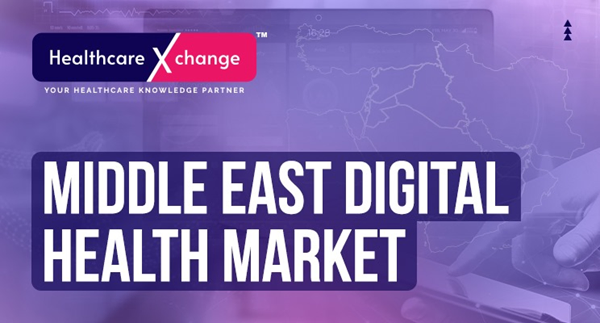
Middle East Digital Health Market – Part 1
- Imaging and diagnostics
- October 15, 2024
The Middle East’s digital health sector is expected to grow and reach USD 7.9 billion by 2026, as reported by dhf.khaleejtimesevents. This growth is fueled by the rising need for home diagnostics, improvements in healthcare technology infrastructure, and the development of user-friendly digital health platforms. The industry’s promising outlook is further underlined by ongoing global health advancements.
Key Digital Health Statistics:
-
Telemedicine consultations in the region have increased by 100% since the COVID-19 epidemic began, proving the region’s preparedness for virtual healthcare services
-
Over 40% of Middle Eastern individuals use health and fitness apps, indicating a rising trend towards proactive health management
-
AI usage in healthcare is predicted to expand at a 34% annual pace, propelling improvements in diagnostics, personalised therapies, and patient care
The digital health market in KSA (The Kingdom of Saudi Arabia) and the UAE (United Arab Emirates) is projected to be valued at USD 4 billion by 2026, as per a recent analysis by McKinsey & Company. Both nations are poised to integrate digital health technologies, focusing on areas such as chronic illness management, diagnostics, and preventative care, aiming to enhance patient care and outcomes. The governments in both regions have made substantial investments in digital health and technology to modernise and enhance the healthcare industries. This has garnered interest from major technology companies such as Apple, Amazon, Google, and Microsoft, as these tech giants seek to offer advanced digital health solutions in the region.
KSA’s 2030 Digital Health Journey: A Brighter Future in Digital Well-Being
The Saudi Government continues to prioritise the healthcare sector, with the kingdom accounting for 60% of the Gulf Cooperation Council (GCC) states’ healthcare expenditure. According to a prior McKinsey & Company study, the benefits of digital technology and services might create more than USD 250 billion in global GDP by 2030.
-
Saudi Arabia has proposed a plan to drastically modernise its hospital infrastructure as part of the country’s Vision 2030 strategy
-
It intends to upgrade the sector and promote public private partnerships with a USD 65 billion investment
-
The objective is to increase the sector’s contribution from 40 percent to 65 percent by 2030
-
The government intends to privatise 290 hospitals and 2,300 primary healthcare centres, allowing for increased private sector investment and engagement in the healthcare business
-
The life expectancy in Saudi Arabia continues to rise, with forecasts indicating that it will reach 81.8 years by 2050, and the population predicted to reach 39.4 million by 2030
-
Market assessments and benchmarks indicate large investments in healthcare facilities and equipments along with technologies to ensure that the country can effectively provide essential services to its growing population
UAE Pioneering Digital Health Revolution for a Healthier Tomorrow
The healthcare perspective in the UAE has changed dramatically over the last decade, owing to advances in medical technology. The developments include AI predictive modeling, genome sequencing, smart wearables, and telemedicine. The proliferation of applications for digital health and technical solutions contributes to the upward trajectory. The UAE healthcare market is anticipated to be valued at more than USD 2 billion by 2025. According to Insights10, the UAE Digital Health market is predicted to grow at a 19.6 percent CAGR from USD 1.06 billion in 2022 to USD 4.42 billion by 2030.
-
More than 80% of healthcare facilities in the area currently use electronic records, like the Universal Electronic Medical Recorder. The system stores a patient’s complete medical history and makes it accessible to approved practitioners nationwide.
-
The Emirates Health Services (EHS) Innovation Strategy for 2023-2026 aims to create a long-term future for healthcare in the country. This approach is consistent with the National approach for Wellbeing 2031 and the “We the UAE 2031” vision, as well as the goals of the UAE Centenary 2071.
-
According to a PwC forecast, AI adoption in the healthcare business might result in yearly savings of up to USD 22 billion for the UAE healthcare system by 2030.
-
According to the Dubai Health Authority (DHA), healthcare institutions in the city provided over 300,000 telemedicine consultations in 2022, a 24% increase from the previous year.
-
Dubai has effectively incorporated technology into its healthcare system with 129 hospitals currently providing telemedicine services.
-
The UAE’s commitment to precision medicine is crucial for meeting global healthcare needs, as demonstrated by the National Genome Strategy launched in March 2023. It aims to develop genome-focused initiatives and lead the way in precision medicine.
-
IROS, a research firm in the UAE, provides a wide range of knowledge, innovative technologies, and strong research resources to both the MENA region and the rest of the world. It highlights the importance of diversity in scientific and medical research.
The Digital Pulse of Healthcare in the UAE
The current digital revolution in the healthcare sector has considerable promise for improving patient care, optimising operational efficiency, and promoting innovation. The UAE is working hard to improve its healthcare infrastructure. Here are some of the major features and advances in the UAE’s digital health landscape:
-
AI Hosn App: The app has revolutionised healthcare in the UAE by digitising medical data. It enables the monitoring of vaccination rates in real-time, and plays a vital role in the management and prevention of contagious diseases.
-
Enhanced Patient Care: Malaffi, a health information platform in Abu Dhabi, has been connected to the federal Riayati network. It allows medical professionals using Malaffi to access comprehensive patient records from the Northern Emirates, leading to more efficient and systematic patient treatment.
-
Clinical Genomic Medicine: The healthcare regulator in the UAE has introduced a plan-of-action – The Clinical Genomic Medicine and Genetic Counseling Programme. It aims to train 100 Emirati physicians from different healthcare facilities in the UAE. It is a collaboration between the regulator, iCGD, Brigham and Women’s Hospital, Harvard Medical School, and Khalifa University of Science and Technology. The programme is focused on providing a thorough education in genomics.
The healthcare system in the UAE has made significant progress, with advancements such as AI-powered diagnostics and the use of drones to deliver medications. These improvements will lead to more accurate diagnosis, shorter wait times, and easier access to proactive health solutions. Technology will make healthcare more widely available and accessible to all.





